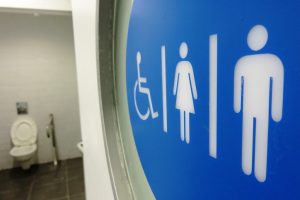DOJ Reverses Stance On Transgender Workplace Protections
When will this issue will reach the Supreme Court for resolution?
 In another about-face from the Trump administration, Jeff Sessions issued a memo two days ago stating that Title VII of the Civil Rights Act (which bans workplace discrimination on the basis of sex) does not protect individuals against discrimination on the basis of “gender identity per se, including discrimination against transgender individuals.” The memo explains that the Justice Department’s position is now that “sex,” as used in Title VII, means only “biologically male or female.”
In another about-face from the Trump administration, Jeff Sessions issued a memo two days ago stating that Title VII of the Civil Rights Act (which bans workplace discrimination on the basis of sex) does not protect individuals against discrimination on the basis of “gender identity per se, including discrimination against transgender individuals.” The memo explains that the Justice Department’s position is now that “sex,” as used in Title VII, means only “biologically male or female.”
The memo is directed to all U.S. Attorneys and heads of federal agencies. This means that the Department of Justice will take this position in all pending and future matters (except where controlling lower-court precedent dictates otherwise, in which event the issue should be preserved for potential future review).
This reverses a 2014 policy from the Justice Department directly to the contrary. Then-Attorney General Eric Holder’s 2014 position on the matter was that the word “sex” in the statute “extends to claims of discrimination based on an individual’s gender identity, including transgender status.”

Is The Future Of Law Distributed? Lessons From The Tech Adoption Curve
Devin O’Malley, a spokesperson for the Justice Department, was quoted as saying, “The Department of Justice cannot expand the law beyond what Congress has provided. Unfortunately, the last administration abandoned that fundamental principle, which necessitated today’s action . . . This Department remains committed to protecting the civil and constitutional rights of all individuals, and will continue to enforce the numerous laws that Congress has enacted that prohibit discrimination on the basis of sexual orientation.”
This move is hot on the heels of President Trump announcing that transgender individuals will be prohibited from serving in the military. The Justice Department also recently sided with a Colorado baker in a case pending before SCOTUS this term in which the baker refused to bake a wedding cake for a same-sex couple as he claims it was against his religious beliefs.
Similarly, the Justice Department last week came out against the Equal Employment Opportunity Commission (the federal agency tasked with enforcing Title VII) in the U.S. Court of Appeals for the Second Circuit in the case of Zarda v. Altitude Express. The plaintiff, a skydiver, claims his employer fired him because of his sexual orientation. The Justice Department and the EEOC took opposite sides in their respective amicus briefs as to whether sexual orientation should be considered sex discrimination under Title VII.
The EEOC’s position is still firmly that transgender status is protected under Title VII. In fact, the EEOC just filed suit against a company in Denver over alleged discrimination against a job applicant on the basis of transgender status. This is consistent with the EEOC’s 2016 Strategic Enforcement Plan, which includes “[p]rotecting lesbians, gay men, bisexuals and transgender (LGBT) people from discrimination based on sex” as a top enforcement priority.
Sponsored

Early Adopters Of Legal AI Gaining Competitive Edge In Marketplace

Is The Future Of Law Distributed? Lessons From The Tech Adoption Curve

The Business Case For AI At Your Law Firm


Early Adopters Of Legal AI Gaining Competitive Edge In Marketplace
So far, the Seventh Circuit is the only federal appellate court holding that workplace discrimination based on sexual orientation violates Title VII. That decision, Hively v. Ivy Tech, was issued earlier this year in April.
It is unclear when this issue will reach SCOTUS for resolution. Until then, however, we will continue to see a confusing and contradictory approach applied by the EEOC and the Department of Justice.
 Evan Gibbs is an attorney at Troutman Sanders, where he primarily litigates employment cases and handles traditional labor matters. Connect with him on LinkedIn here, or e-mail him here. (The views expressed in this column are his own.)
Evan Gibbs is an attorney at Troutman Sanders, where he primarily litigates employment cases and handles traditional labor matters. Connect with him on LinkedIn here, or e-mail him here. (The views expressed in this column are his own.)
Sponsored

Legal AI: 3 Steps Law Firms Should Take Now








